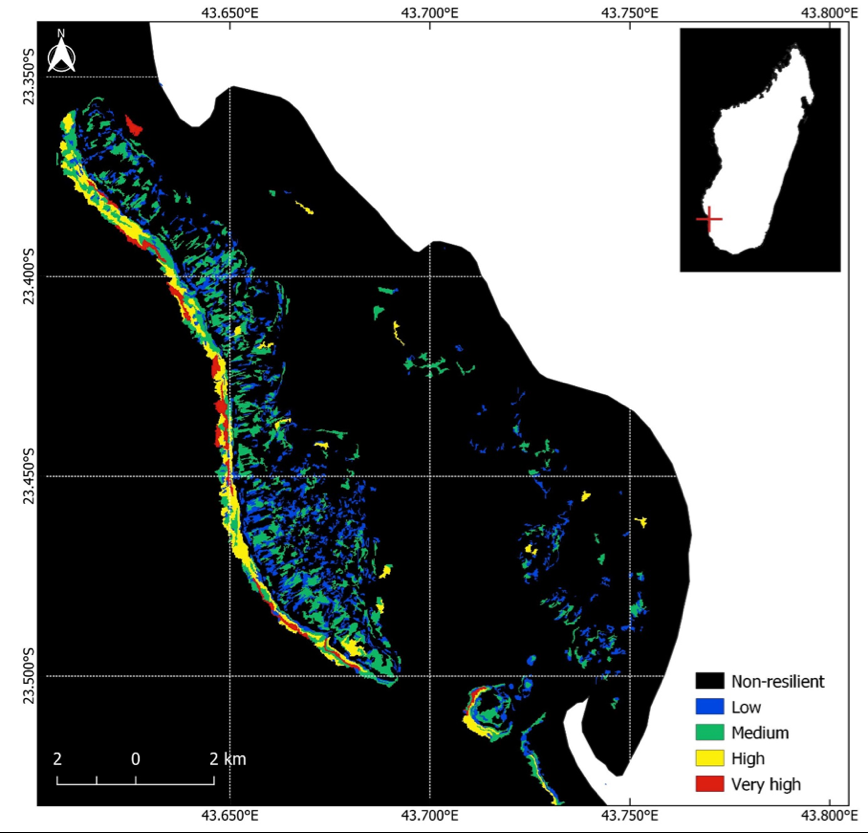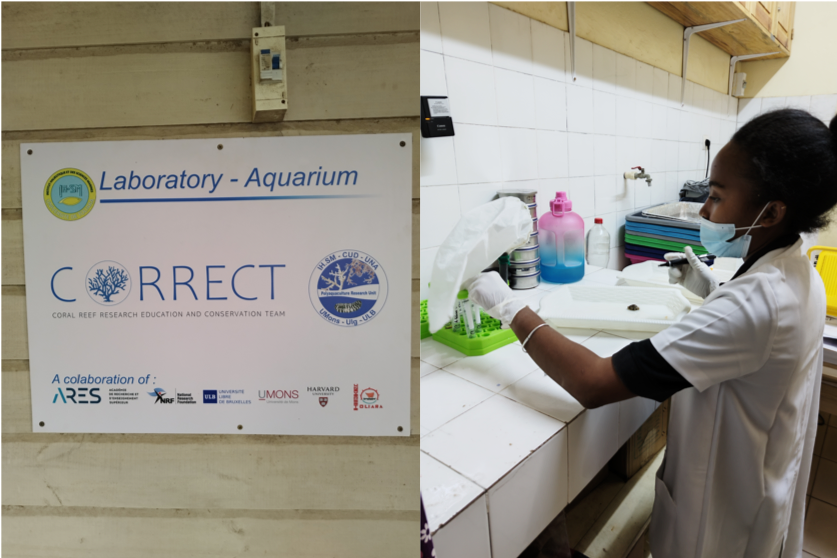AETHER - FGF Coral Reefs
The degradation of coral reefs is materialized by the accumulation of dead coral debris or coral rubbles. The dominance of coral ruble results from mechanical degradation of corals due to intense human activity. Thus, through an innovative ecological designing and engineering, coral rubbles are valorized to create artificial reef habitat for reef species. Through the initiative, we aim at contributing to repair and restore reef habitats destroyed by fisheries activities and the effects of global change. The main objectives of the project are to manufacture and install, with coastal communities, artificial reef models, and to recruit PhD student (Aina Le Don Nomenisoa) and technician who will ensure scientific surveys and analysis of results, as well as communication of these expected results. The project also aim at involving and training fishermen in these activities.
Remote Sensing
The project focuses on Remote Sensing: technology accessible to everyone for studying coral reefs. We are working on the Assessment of Coral Reef Resilience Based on Remote Sensing Approaches: The Case of the Bay of Toliara, Madagascar.
In addition to their ecological value, coral reefs also provide socio-economic benefits, contributing at least 30 billion US dollars when combined with tourism and recreation, coastal protection, fishing, and biodiversity services. Unfortunately, these ecosystems are threatened globally and locally due to climate change and the effects of anthropogenic pressures. However, one of the biggest challenges in understanding coral reefs is that they are very difficult to measure. Conventional monitoring methods only provide information on a small portion of these habitats at a time (e.g., for the Southwest of Madagascar Todinanahary et al., 2018, Botosomananto et al., 2021).

Coral Lab
The Coral Lab is a research and development initiative focused on coral reefs, integrating various smaller projects aimed at the preservation, restoration, and education on coral ecosystems. The combined efforts of our researchers, doctoral students, and student interns have led to significant achievements in several key areas.
Key Achievements
Creation of the CoRRECT Team We established the Coral Reef Research, Education, and Conservation Team (CoRRECT), which brings together all active researchers in the field, including permanent research faculty, doctoral students, and research interns. This team is dedicated to promoting cutting-edge research, education, and conservation of coral reefs.
Development of Village Coral Farming Developing village coral farming is one of our priorities, aiming to involve local communities in the preservation of coral reefs. This initiative not only helps restore reefs but also creates sustainable economic opportunities for coastal villages.
Development of Artificial Reefs We have also innovated in the field of artificial reefs, contributing to the development and implementation of patented models using coral debris, known as Fishes Banking ecotechnology® (FBe). These artificial reefs provide crucial habitats for fish and help revitalize damaged coral ecosystems.
Protection of Black Corals Our project includes significant efforts for the protection of black corals at both national and international levels. We played a key role in the establishment of Ministerial Decree No. 21816/2014, which bans the exploitation of black coral (Antipatharia sp.) in Madagascar, in response to the illegal exploitation of these valuable corals.
Conclusion
The Coral Lab embodies our commitment to protecting and restoring coral reefs while involving local communities and innovating with sustainable technologies. Our efforts focus on research, education, and the implementation of effective conservation practices, ensuring a healthier future for marine ecosystems and the communities that depend on them.

Training and Capacity Building
Training is one of the main objectives of the Coral Lab. All team members and students involved in the project receive continuous training throughout the project’s duration. This ensures that they are equipped with the latest knowledge and techniques in coral reef research and conservation.

Rebuilding coral reefs in Madagascar using a new tool to restore biodiversity, build fisheries, and improve human health.
Abstract about the project
Coral reef decline threatens human lives because this ecosystem provides food, income, and shoreline protection. Reef restoration is particularly necessary in Madagascar where reef fisheries have declined, causing widespread human malnourishment. The Bay of Ranobe is a 32 km lagoon in southwest Madagascar. Fishing and aquaculture are the predominant source of food and livelihood for individuals living in the thirteen villages adjacent to the Bay. The Bay’s fishery is managed by FIMIHARA, a grassroots organization of fishers and other stakeholders. In response to declining fisheries catch, the organization decided to expand reef habitat by installing small artificial reefs on the seafloor in collaboration with the NGO Reef Doctor. To scale up this reef restoration approach, Reef Doctor and FIMIHARA are collaborating with marine scientists at the University of Tulear (Madagascar, ~30km from the Bay), the Swedish Royal Academy of Sciences (Sweden), IRD (France), and Harvard University (USA). With support from the Belmont Forum and national funding agencies, the international team is building large artificial reefs (1 hectare) and applying simple technologies to seed them with biota from healthy natural coral reefs—jumpstarting artificial reef succession and fisheries production. The team will experimentally test, at reef scale, whether seeding artificial reefs produces healthy reef ecosystems, increases fisheries yields, and improves human health. The project also investigates how existing marine aquaculture in the area adds benefits to local communities and if these activities can be part of the sustainable use of the coastal ecosystem. Three Malagasy PhD students are supported by the project and gaining their doctorates will increase marine science capacity in the country. If successful, this project will produce a new way to rebuild coral reef ecosystems and will greatly enhance the equitable and sustainable use of marine resources with a tool that can be applied anywhere these ecosystems are found.


